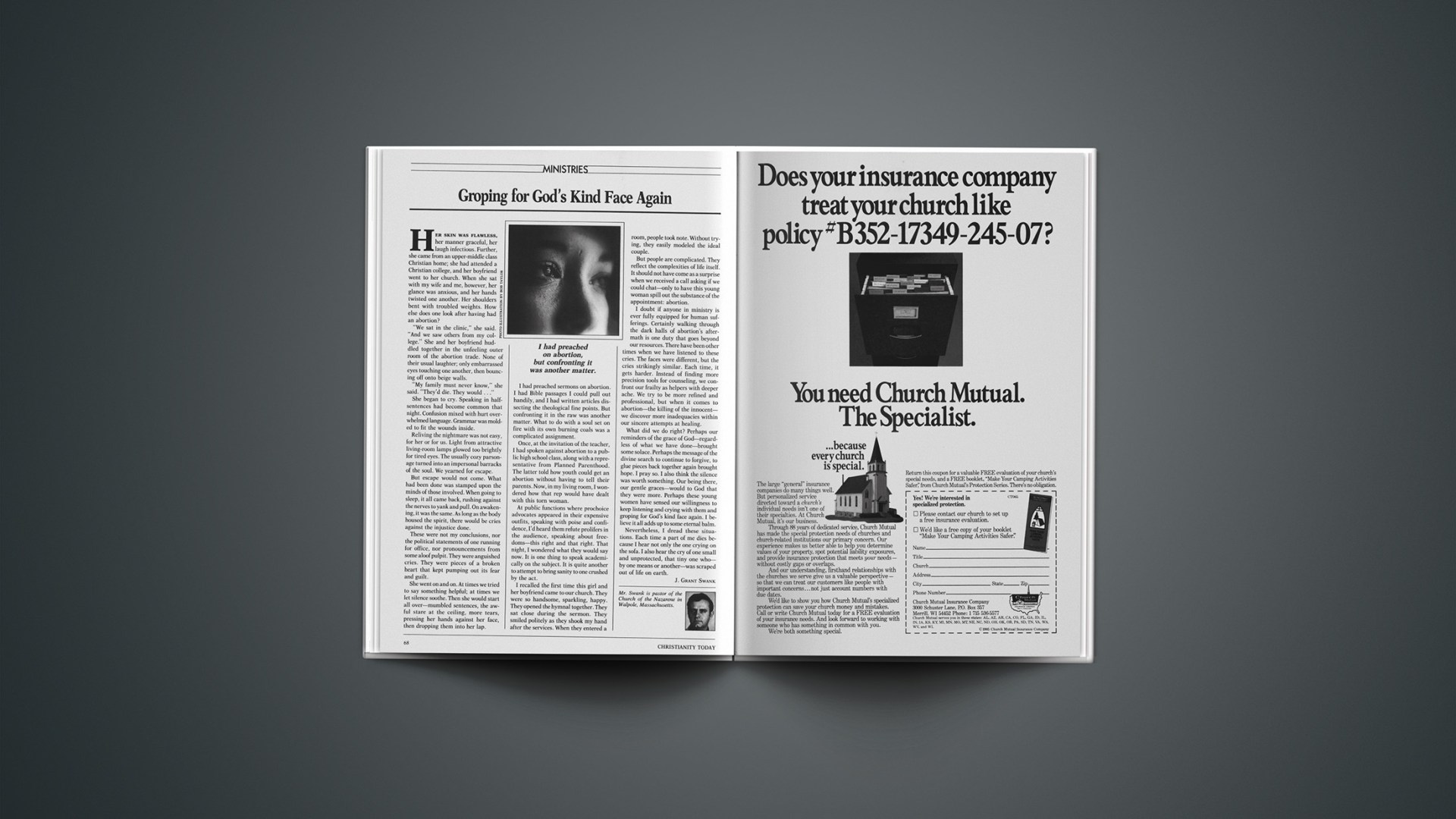Her skin was flawless, her manner graceful, her laugh infectious. Further, she came from an upper-middle class Christian home; she had attended a Christian college, and her boyfriend went to her church. When she sat with my wife and me, however, her glance was anxious, and her hands twisted one another. Her shoulders bent with troubled weights. How else does one look after having had an abortion?
“We sat in the clinic,” she said, “And we saw others from my college.” She and her boyfriend huddled together in the unfeeling outer room of the abortion trade. None of their usual laughter; only embarrassed eyes touching one another, then bouncing off onto beige walls.
“My family must never know,” she said. “They’d die. They would …”
She began to cry. Speaking in half-sentences had become common that night. Confusion mixed with hurt overwhelmed language. Grammar was molded to fit the wounds inside.
Reliving the nightmare was not easy, for her or for us. Light from attractive living-room lamps glowed too brightly for tired eyes. The usually cozy parsonage turned into an impersonal barracks of the soul. We yearned for escape.
But escape would not come. What had been done was stamped upon the minds of those involved. When going to sleep, it all came back, rushing against the nerves to yank and pull. On awakening, it was the same. As long as the body housed the spirit, there would be cries against the injustice done.
These were not my conclusions, nor the political statements of one running for office, nor pronouncements from some aloof pulpit. They were anguished cries. They were pieces of a broken heart that kept pumping out its fear and guilt.
She went on and on. At times we tried to say something helpful; at times we let silence soothe. Then she would start all over—mumbled sentences, the awful stare at the ceiling, more tears, pressing her hands against her face, then dropping them into her lap.
I had preached sermons on abortion. I had Bible passages I could pull out handily, and I had written articles dissecting the theological fine points. But confronting it in the raw was another matter. What to do with a soul set on fire with its own burning coals was a complicated assignment.
Once, at the invitation of the teacher, I had spoken against abortion to a public high school class, along with a representative from Planned Parenthood. The latter told how youth could get an abortion without having to tell their parents. Now, in my living room, I wondered how that rep would have dealt with this torn woman.
At public functions where prochoice advocates appeared in their expensive outfits, speaking with poise and confidence, I’d heard them refute prolifers in the audience, speaking about freedoms—this right and that right. That night, I wondered what they would say now. It is one thing to speak academically on the subject. It is quite another to attempt to bring sanity to one crushed by the act.
I recalled the first time this girl and her boyfriend came to our church. They were so handsome, sparkling, happy. They opened the hymnal together. They sat close during the sermon. They smiled politely as they shook my hand after the services. When they entered a room, people took note. Without trying, they easily modeled the ideal couple.
But people are complicated. They reflect the complexities of life itself. It should not have come as a surprise when we received a call asking if we could chat—only to have this young woman spill out the substance of the appointment: abortion.
I doubt if anyone in ministry is ever fully equipped for human sufferings. Certainly walking through the dark halls of abortion’s aftermath is one duty that goes beyond our resources. There have been other times when we have listened to these cries. The faces were different, but the cries strikingly similar. Each time, it gets harder. Instead of finding more precision tools for counseling, we confront our frailty as helpers with deeper ache. We try to be more refined and professional, but when it comes to abortion—the killing of the innocent—we discover more inadequacies within our sincere attempts at healing.
What did we do right? Perhaps our reminders of the grace of God—regardless of what we have done—brought some solace. Perhaps the message of the divine search to continue to forgive, to glue pieces back together again brought hope. I pray so. I also think the silence was worth something. Our being there, our gentle graces—would to God that they were more. Perhaps these young women have sensed our willingness to keep listening and crying with them and groping for God’s kind face again. I believe it all adds up to some eternal balm.
Nevertheless, I dread these situations. Each time a part of me dies because I hear not only the one crying on the sofa. I also hear the cry of one small and unprotected, that tiny one who—by one means or another—was scraped out of life on earth.
Mr. Swank is pastor of the Church of the Nazarene in Walpole, Massachusetts.










